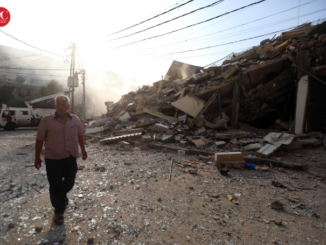
It’s not often that you find the Palestinian Solidarity Movement (PSM) and Israeli PM Benjamin Netanyahu in agreement on the borders of Israel. But with momentum for a single-state future for Israel/Palestine reaching a pitch amid Netanyahu’s last-minute campaign vows in April to annex Israel’s illegal West Bank settlements, White House Senior Advisor Jared Kushner passing what appears to be a (post-mortem on the two-state solution) ahead of his “Deal of the Century,” and U.S. Ambassador to Israel David Friedman defying every legal resolution on Israel ever by claiming Israel has a right to (annex parts of the West Bank), the PSM’s last several years of advocacy and the rhetoric of Bibi and his supporters in the White House have begun to softly merge with regards to the shape of a future, single-state in the region.
And now, after failing to create a coalition following April’s snap-election and dissolving Israeli Parliament yet again, an unprecedented electoral double-header for the Jewish State, Netanyahu will have until September 17th to moisten promises of West Bank annexation to the Israeli citizenry, nearly (half of whom already support annexation of some kind).
As if the Islamophobia of April’s elections weren’t stomach-turning enough, we now have the rare privilege of being able to sit back and watch the very same candidates tap the very same ethno-nationalist veins again, only two months removed. With the nil prospects of Palestinian sovereignty pending on the results of the election by Trump & co, it’s doubtful we’ll see any Israeli candidate run counter to the platform of the permissible and politically-correct American Imperial phraseology of “Military Occupation,” and “Annexation.”
So the two-state solution may well be officially dead, and the potential re-election of Benjamin Netanyahu to a record fifth (or, Parliamentary scholars, with back-to-back elections, is it actually his sixth?) term as Israel’s Prime Minister could be identified in retrospect as it’s official death-knell. By the time Trump disgorges his “Deal of the Century” we should know.
As the single-state reality looms closer than it ever has before, I sat down with Andrew Ross whose new book “Stone Men: The Palestinians Who Built Israel”, makes a landmark case for Palestinian civil rights in a single Israeli-Palestinian state based on over a century’s worth of their exploited labor at the behest of Israel’s construction industry.
Stone Men: The #Palestinians Who Built #Israel – Book Review https://t.co/aqNpYnQKRC @PalestineChron pic.twitter.com/H4CA0Q8iB1
— Palestine Chronicle (@PalestineChron) April 3, 2019
Spending three years in the West Bank of Palestine, which sits on one of the richest sandstone and limestone deposits in the world, and whose resources and laborers have gone on to build and furnish almost every state in the Gulf as well as the state of Israel, Ross conducted hundreds of interviews with Palestinian workers and business owners at every juncture in the chain of exploitation, proving the subtitle, “The Palestinians Who Built Israel”, far from hyperbole and closer to a labor-reality than the Palestinian Solidarity Movement has yet taken note of.
With arguments of morality and human rights falling on deaf, if not castrated ears, Ross’s research provides a viable Plan B for activists within a single-state framework, and could end up reshaping not just the arguments on the ground and in the armchairs of the PSM, but the course of Israel-Palestine in international politics and government. The exploitation of the Palestinian laborers is one that doesn’t get told.
Barney: Amid pre-election speculation that Netanyahu was warming to ideas of annexing parts of the West Bank and applying Israeli law to those regions, PLO Chief Executive Saeb Erekat said that he couldn’t rule out Trump declaring Gaza an independent state and declaring the West Bank as Israeli territory.
Ross: I can certainly see the former, and incorporating the settlement territories in Area C would also be a natural step for Netanyahu. Annexing the whole of the West Bank is probably beyond him at this point and would open up the whole thorny prospect of the single-state scenario.
Barney: Since you began your field research in 2015 to the present day, momentum has grown in the solidarity circles behind a single-state. Did your thinking change at all over the course of your research?
Ross: Not so much on that issue, though being on the ground and doing extensive fieldwork in the West Bank is an effective form of reality testing, to say the least. For example, you get a sense of the real difficulty most people have in traveling from town to town, the brutal presence of the Israeli military, and of the impacts of the spreading archipelago of settlements and checkpoints. You have a more direct experience of the challenges faced daily by Palestinians. Some in the solidarity movement who do good work operate from armchairs and so their frame of reference is a theoretical map that quite obviously shows how impractical a state based on contiguous territory in the West Bank would be. To try to move around in the territories along with Palestinians really brings home the futility, at this point, of carving out a partitioned state from the quarantined Bantustan islands of Palestinian residence.
The transnational political class (in Washington, Jerusalem, and Ramallah) is still very much tied to holding a firm line around two-state. But the conversation on the ground among activists and solidarity people, and quite frankly most of the people I encountered in the West Bank, has moved on. It just so happened that a lot of my research fed into arguments about how labor-based political equity—the principle that building a country should translate into civic and political rights within it– could play some role in the evolving conversation about a unitary democratic state.
Barney: When the US Senate passed the “Combatting BDS Act” back in January, Senator Marco Rubio claimed the boycott campaign was anti-semitic and intent on destroying Israel. The BDS routinely faces critique of this kind. But in Stone Men, you trace the history of Zionist boycotts of Arab labor, which were sometimes violent and slogan’d as “purifying” Jewish workplaces of Arabs. Can you talk about the irony here?
Ross: There’s so many ironies. The history you’re referring to was a very well-known, infamous campaign called the Conquest of Labor (kibbush ha’avoda). Towards the end of the Ottoman era, and then during the British Mandate, intense pressure was put on Jewish and foreign employers to exclude Arabs from their workforce. There was a lot of sound and fury about using only “Hebrew Labor”, and strong-arming tactics were deployed to enforce what was in effect a boycott. And there was also a counterpart consumer boycott campaign, where an effort was made in the Jewish (yishuv) community to boycott any goods produced with Arab, or what Zionists often called “foreign,” labor.
But these campaigns, and others in more recent decades to replace Palestinian labor, were only ever partially successful. Employers preferred Palestinian workers, and they still do, especially in the construction industry, in the physical work of building what the Balfour Declaration called the “Jewish national home”. At that time it was because Arab workers were cheaper and better, and had centuries of construction experience in the region, and their labor politics were less militant than many of the Jewish settlers, who were quite overtly socialist. Nowadays there are even more reasons for this abiding preference.
As for Palestinians, it is almost impossible for them to boycott Israeli products (they would starve), and previous efforts to withdraw their labor from Israel, during the first intifada, proved difficult to enforce. So the boycotts have mostly been on the Zionist side of the register and continue to be so. Even the 20% of the Israeli population that is Palestinian are effectively barred from many workplaces where employers will only employ veterans who served in the army (in Israel there is obligatory conscription in the army for all citizens), and 99% of Israeli Palestinians don’t serve.
Barney: How can the rights of the Palestinians be secured in a future single-state?
Ross: Thinking about the future of Palestine is arguably the best illustration of Gramsci’s maxim about “pessimism of the intellect, optimism of the will.” If you look at the history of efforts to get any kind of reparations—restitution for lost property, compensation for decades of moral suffering, the right of return for refugees—the outcomes are dismal. On the labor front, the longstanding campaign to effect the transfer to Ramallah of social insurance payments extracted from Palestinian workers’ pay-slips has met with Israeli intransigence, even though these sums are sitting in a Bank of Israel account awaiting transfer. If this very obvious debt cannot be easily repaid, what are the prospects for other kinds of reparative justice for Palestinians?
The argument I put forth in the book is about the transitional justice required for a future state, and about new claims on rights based on a century or more of toil contributed to building the country. If you look at other parts of the world, how has the argument for labor-based political equity fared? Bonded or indentured or enslaved or immigrant populations who built other countries haven’t gotten very far with appeals for full inclusion and state-level recognition of rights on the basis of their labor. At least not in the short term–look at what happened to “forty acres and a mule.”
However, I’d say that over time the moral force of the sweat equity argument that building a country equates with rights within it has played a significant role in the full civic and legal acceptance of the laboring populations. The Palestinian case is even stronger because we’re not talking about a population that was brought from elsewhere. These are people have labored on their own ancestral lands, and so the argument is much stronger.
The Voice of #Palestine’s Second Occupation, Part 1 – Book Review https://t.co/Fx23C5hvW4 @PalestineChron pic.twitter.com/EkSL9nv4Yi
— Palestine Chronicle (@PalestineChron) August 8, 2019
Barney: What role does the Palestinian stone industry play in this story?
Ross: The Central Highlands of the West Bank harbor some of the world’s finest dolomitic limestone, and the industry that extracts and fabricates the stone is Palestine’s largest private-sector employer, accounting for its largest share of GDP and exports. It’s the one natural resource that still almost wholly under Palestinian ownership and control. And it’s a bit of a resource curse, because extraction ravages the environment and sickens the workforce.
Ironically, more than 75% of this stone goes to construction sites inside the Green Line, or to the settlements. In other words, the very contents of Palestinian land are being used to build out the state of Israel and the settlements. It’s also a cruel paradox that so many Palestinian livelihoods are dependent on a municipal ordinance that all of Jerusalem’s buildings are required to be faced with this stone, or the desire of settlers to live in homes that look as if they sprouted organically from the stony ground of the holy land.
A large part of the industry is structured around the remnants of the venerable craft of Palestinian stonemasonry, which is now being revived as part of a new interest in cultural heritage. Every sizable village in Palestine once had a master mason who designed, built and passed on all the tools of the trade and the know-how. Without any professional training, these masons constructed what today would be called “architecture without architects.” They built villages, townships, and cities, and they built other people’s nations. Jordan, Kuwait, Saudi Arabia, UAE. Indeed, it’s no exaggeration to say that Palestinians have built almost every state in the region—except their own. And that list includes Israel itself. Despite efforts to replace them over the years, they have always been the preferred labor force of the Israeli construction industry.
Barney: It seems there’s been a switch in Israeli/Zionist treatment of Palestinian workers from the early years of the Conquest to Labor campaign, which was overtly exclusionist. There was a refrain amongst your interviewees that Israeli authorities wanted them stifled and dependent on Israel, not destroyed, because Palestinians provide Israel with a convenient, and easily exploited working class.
Ross: The capitalist economy in the region is also a colonial one, and so there is a comprador class of crony capitalists in Palestine who extract fortunes from their close relationship with the Palestinian Authority. So, too, there are Palestinian middlemen who take a cut from the migrant labor supply line (charging for permits, or recruitment) and then there are the owners of stone firms who I found were doing quite well.
The Occupation is very good for business, on both sides of the Green Line, but for the Israeli economy especially it is a goose that lays golden eggs. Why would Israeli employers prefer to employ Palestinian workers, when they imported a huge migrant labor force from across the world to replace them? There are a lot of reasons. The workers often speak Hebrew and have long-term relations with employers, and they go home every night, so there are no social costs to the Israeli state. Unlike the migrant workers, who live in Israel and send their wages in remittances to their home countries, the Palestinians use their wages to buy Israeli goods at Israeli prices in the West Bank. So all of that makes for a win-win situation for the Israeli economy.
Plus, in the long term, transferring these workers out of agriculture and into wage labor weakens their attachment to the land and makes it easier for settlers to seize. Lastly, the “reward” of a work permit is given in return for keeping the peace. If a relative gets arrested or jailed, the permit gets taken away for the entire family, and so the work permit system is an effective form of economic pacification.
For the workers, the quandary of working for the occupier is psychologically and economically fraught. The journey to and from work is arduous and risky, leaves hardly any family time at the end of the day, and, of course, involves the intense humiliation of the checkpoint routines. I describe Palestinians who work inside Israel or in the settlements as a compulsory workforce. It’s not forced labor but it’s certainly not free labor, because the alternative is little better than a starvation wage, and that is by design. The Israeli policy of stifling economic development in the West Bank, and of de-development in Gaza is responsible for this predicament.
Barney: Is the PA complicit in the exploitation of Palestinian labor?
Ross: Before Oslo, many of the crony capitalists had been operating overseas, especially in the Gulf States, where they played an effective intermediary role. Palestinians who worked in the Gulf as engineers also created their own companies, which are now some of the biggest construction contractors in that region. After Olso, (Yasser) Arafat made a real effort to bring them home to the West Bank along with the PLO, and have them function as a sort of native capitalist class, providing investment for development. In return, they were given lucrative contracts that offered monopolies on the flow of goods, services, and utilities from Israel. On a daily basis, most of the things that Palestinians use or buy generates a profit for that particular class of Palestinian capitalists.
By contrast, the stone industry is made up of small family-owned firms, where the same names come up and up again. A few firms have scaled up, but it’s mostly an under-capitalized village-based economy, distant from the PA and not subject to much regulation from the authorities. This kind of capitalist economy is one that I characterize as “careful competition,” because the stone families co-exist, and have known each other for generations.
The free market economy is enshrined in Palestine’s Basic Law and is largely taken for granted, though the resentment of the crony capitalists and the PA runs deep. The Palestinians unions, and not just in the stone industry, are quite weak as a result, though there has been an upsurge of new unions, operating independently of the general federation and the PA, and they sometimes cooperate informally with the new generation of Israeli trade unions, especially in organizing within the settlement industrial zones.
Barney: Is it difficult for Palestinian stone companies to operate and export?
Ross: In my interviews with owners of the stone firms, they chafed at the constraints placed upon them by Israeli authorities, especially with respect to logistics, and the obstacles to exporting directly from the West Bank. Then there are also restrictions on production. For example, Palestinian producers are generally prohibited from using explosives like dynamite in the quarries, which puts them at a considerable disadvantage in competing with other producers in the region. And in the export trade, there’s a lot of fraudulent selling and exporting on the part of Israeli firms who buy stone from the West Bank and export it in their own name with a large markup. And I discovered there is a Chinese angle too. Most recently Chinese investors have been buying defective stone in the West Bank, pulverizing and mixing it in with other stones and marketing the product in China as “Jerusalem Stone.”
Barney: Is it easy for Palestinian companies to get permits to quarry in Palestine? Or is constrained?
Ross: Most of the remaining good stone is in Area C, and very few Palestinian producers can get permits to operate there. Consequently, work crews take their equipment in on the weekends, on Friday and Saturday, when soldiers are not around, and they operate around the clock to see what they can extract. It’s quite a risky operation, and oftentimes bribes are required to pay off the authorities.
The overall point of these restrictions and constraints is not to shut down the industry—it’s an essential service to the Israeli economy–but to make it as difficult and as degrading as possible for producers to operate and thrive. That’s the guiding colonial principle of the Occupation regime.
Barney: Did you interview any workers who labor on the wall or in settlements?
Ross: Yes, I did, and they were usually workers who lived in communities directly adjacent to the settlements and thus under constant threat of seizure, which meant they were often working on land that had only recently belonged to their villages. The pain involved in that kind of situation was quite obvious to me in the interviews. It’s technically illegal to work in a settlement, but since the PA has no alternative to offer there’s no enforcement of that ban, and for families who have been barred from getting a permit to work in Israel, it’s a viable alternative since you don’t need one in the settlements. In the public mind, the settlements are designed to exclude Palestinians, but on most days of the week, you’ll find them building houses, roads, and other infrastructure. As for those laboring on the separation barrier, they are building their own prison wall, and there can be few tasks more demeaning.
Despite all the indignities and abuses thrown in their path, the resilience of the workers I met is what stayed with me. Their resolute and enduring will to show up for work is, in many ways, an expression of sumud–the Palestinian resistance philosophy of steadfastness. They will not be moved, as they were in the Nakba, or replaced by a substitute workforce, or wiped off the map of their own ancestral lands.
– Nicholas Vincenzo Barney is an American writer, journalist, and advocate for human rights in Palestine. After the death of a close friend from the West Bank, Nicholas V. Barney has made several trips to Palestine and has spent considerable time living with Palestinian families. He contributed this article to the Palestine Chronicle.








There is a method to mossad agent Rachel madcows constant Russia Russia madness. Its a con to keep the goyim off the scent, trump is actually a Manchurian candidate for Israel, Ehud barak has all of epsteins videos (he was the handler having seen him 10 times that we know off, it wasnt for enjoying goyim lolitas). The fact that there was no dead man switch release of insurance videos upon epsteins “suicide” should say enough to any discerning observer.